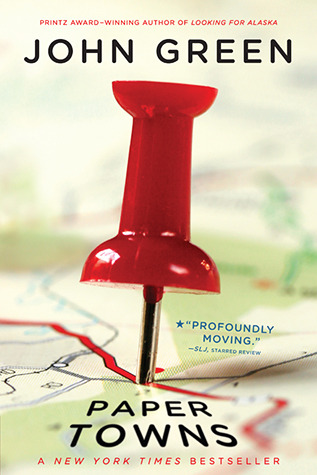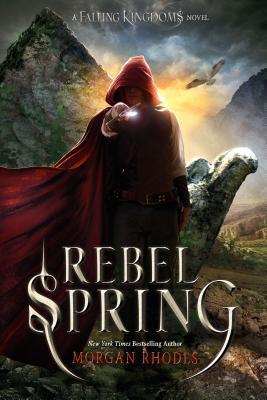Paper Towns
by: John Green


Quentin Jacobsen has spent a lifetime loving the magnificently adventurous Margo Roth Spiegelman from afar. So when she cracks open a window and climbs back into his life—dressed like a ninja and summoning him for an ingenious campaign of revenge—he follows. After their all-nighter ends and a new day breaks, Q arrives at school to discover that Margo, always an enigma, has now become a mystery. But Q soon learns that there are clues—and they’re for him. Urged down a disconnected path, the closer he gets, the less Q sees of the girl he thought he knew.
I thought this was a brilliant book about the reality of human beings both constantly being misimagined and constantly misimagining others.
I thought this was a brilliant book about the reality of human beings both constantly being misimagined and constantly misimagining others.
Smart and Funny Hero: CHECK
Quentin Jacobsen is funny, quirky, and completely obsessed with Margo Roth Spiegelman. As John Green describes it, Margo is Quentin's "Manic Pixie Dream-girl". Especially after Margo disappears, Quentin cannot go for very long without thinking about Margo and what she's doing or thinking. He is also a great friend to Ben and Radar. They all had their different obsessions (Ben's was "honey-bunnies", Radar's was omnictionary, and Quentin's was, of course, Margo Roth Spiegelman). But they told each other to shut up when they each needed it. The whole point of the book is that Quentin realizes that Margo is not the person he has been imagining her as. He realizes that he doesn't know who she is when she's not being the Margo Roth Spiegelman that people believe her to be. The fact is that no one knows that Margo. She doesn't even who that Margo is.
Interesting and Unique Heroine: CHECK
Margo was both interesting and unique and yet wholly familiar. Anyone reading this book knows what it is like to be misimagined even by those who know you the best. We might not realize that is what we're feeling, but it is. We have to reconcile ourselves to the fact that no one can know the inner workings of our minds perfectly and we cannot know their minds. We have to find a way to accept this without thinking of ourselves as only what others observe. We cannot begin to think of ourselves as paper people. That is the journey that Margo Roth Spiegelman has to take in this book. She had to leave to discover who she was outside of how others see her and her crazy antics.
Extraordinary Supporting Characters: CHECK
Radar: He cracked me up. I wish there had been more of him, but I know that the story isn't about him. I thought his relationship with Angela was adorable (the tiny bit of it that we got to see).
Ben: Annoying. He was so annoying. But, I liked his friendship with Q. I know that Quentin needed a friend to make him less serious. Ben and Q are basically opposites. That's why they worked so well together.
The Roadtrip: Oh gosh, THE ROADTRIP. I was basically dying of laughter through all the roadtrip scenes. They were brilliantly written, because while the inner musings of Q about our ideas of people didn't stop, the humor got amped up to ten. I can definitely see John's humor in the dialogue he writes between Radar, Ben, and Quentin.
Unique Setting and Purposeful Theme: CHECK
I love the whole idea that this book was written about. That we can never truly understand or be other people. The idea that we all too often forget to see other people as just as real and human and fallible as we ourselves are. Other people make mistakes and have faults and live 24 hours each day, just like we do. John addresses this idea from all perspectives in all different ways, over and over again. This book also discusses the idea of leaving. How leaving can be terrifying until you do actually leave and then it's liberating.
Excellent Plot and Speed: 1/2 CHECK
The plot was fantastic. The mystery felt real to the reader as well as Quentin. You get led through a number of ideas of what might have happened to Margo. The great thing is all of the possibilities that are given lead Q closer to realizing that the person he thought Margo was might not be the true Margo Roth Spiegelman. With each step closer to Margo we learn more about who Quentin Jacobsen is. My problem with this book (and almost every other contemporary that I've ever read) is that I often have a problem with the pacing. I sometimes feel like they are not actually going anywhere. There are long stretches of the same things happening again and again and it often throws me off. However, this is more of a particular taste problem and not anything wrong with the book.
So this was a fantastic and beautiful book. It makes its point clearly and it holds to the truth of reality.
Quotes:
"What a treacherous thing to believe that a person is more than a person."
"The town was paper, but the memories were not."
"It is so hard to leave-until you leave. And then it is the easiest...thing in the world."
“If you don't imagine, nothing ever happens at all.”
“When did we see each other face-to-face? Not until you saw into my cracks and I saw into yours. Before that, we were just looking at ideas of each other, like looking at your window shade but never seeing inside. But once the vessel cracks, the light can get in. The light can get out.”
“It is easy to forget how full the world is of people, full to bursting, and each of them imaginable and consistently misimagined.”
"...all the houses that were built to fall apart. All those paper people living in their paper houses, burning the future to stay warm."
"Maybe its like you said before, all of us being cracked open. Like each of us starts out as a watertight vessel. And then things happen - these people leave us, or don’t love us, or don’t get us, or we don’t get them, and we lose and fail and hurt one another. And the vessel starts to crack in places."
“And I wanted to tell her that the pleasure for me wasn't planning or doing or leaving; the pleasure was in seeing our strings cross and separate and then come back together.”
"You will go to the paper towns and you will never come back."
“Isn't it also that on some fundamental level we find it difficult to understand that other people are human beings in the same way that we are? We idealize them as gods or dismiss them as animals.”
“Margo always loved mysteries. And in everything that came afterward, I could never stop thinking that maybe she loved mysteries so much that she became one.”
"If you choose the strings, then you’re imagining a world in which you can become irreparably broken. If you choose the grass, you’re saying that we are all infinitely interconnected, that we can use these root systems not only to understand one another but to become one another. The metaphors have implications."
“Nothing really mattered that much, not the good things and not the bad ones. We were in the business of mutual amusement, and we were reasonably prosperous.”
“This was the first time in my life that so many things would never happen again.”
“Imagining isn't perfect. You can't get all the way inside someone else...But imagining being someone else, or the world being something else, is the only way in."
"I don't know how I look, but I know how I feel: Young. Goofy. Infinite.”
“I kept waiting for that loneliness and nervousness to make me want to go back. But it never did.”
“The fundamental mistake I had always made - and that she had, in fairness, always led me to make - was this: Margo was not a miracle. She was not an adventure. She was not a fine and precious thing. She was a girl.”
“A Margo for each of us--and each more mirror than window.”
"How can you seperate those things though? The people are the place is the people.”













